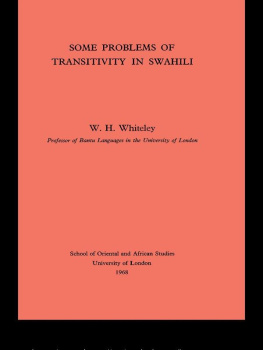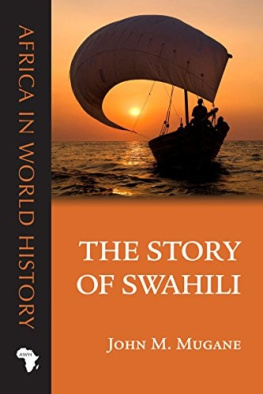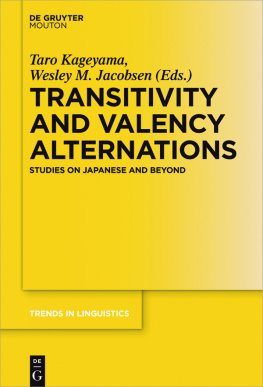Whiteley W. H. - Some Problems of Transitivity in Swahili
Here you can read online Whiteley W. H. - Some Problems of Transitivity in Swahili full text of the book (entire story) in english for free. Download pdf and epub, get meaning, cover and reviews about this ebook. year: 2011, publisher: Taylor & Francis Group, genre: Children. Description of the work, (preface) as well as reviews are available. Best literature library LitArk.com created for fans of good reading and offers a wide selection of genres:
Romance novel
Science fiction
Adventure
Detective
Science
History
Home and family
Prose
Art
Politics
Computer
Non-fiction
Religion
Business
Children
Humor
Choose a favorite category and find really read worthwhile books. Enjoy immersion in the world of imagination, feel the emotions of the characters or learn something new for yourself, make an fascinating discovery.
- Book:Some Problems of Transitivity in Swahili
- Author:
- Publisher:Taylor & Francis Group
- Genre:
- Year:2011
- Rating:4 / 5
- Favourites:Add to favourites
- Your mark:
- 80
- 1
- 2
- 3
- 4
- 5
Some Problems of Transitivity in Swahili: summary, description and annotation
We offer to read an annotation, description, summary or preface (depends on what the author of the book "Some Problems of Transitivity in Swahili" wrote himself). If you haven't found the necessary information about the book — write in the comments, we will try to find it.
Some Problems of Transitivity in Swahili — read online for free the complete book (whole text) full work
Below is the text of the book, divided by pages. System saving the place of the last page read, allows you to conveniently read the book "Some Problems of Transitivity in Swahili" online for free, without having to search again every time where you left off. Put a bookmark, and you can go to the page where you finished reading at any time.
Font size:
Interval:
Bookmark:

TRANSITIVITY IN
SWAHILI
Professor of Bantu Languages in the University of
London
School of Oriental and African Studies
University of London
1968
Copyright by W.H.Whiteley
First edition 1968
This edition published in the Taylor & Francis e-Library, 2005.
To purchase your own copy of this or any of Taylor & Francis or Routledges collection of thousands of eBooks please go to www.eBookstore.tandf.co.uk.
Reprinted, with corrections by Dr. Joan Maw, 1975
ISBN 0-203-98541-9 Master e-book ISBN
ISBN 0 901877 79 4 (Print Edition)
The following essay is a tentative study of a little explored area of syntax. It suffers, I am sure, from all the faults that one associates with exploratory studies, most notably, I suppose, from premature generalizations, but if it stimulates others to go further it will have achieved its purpose.
Nearly twenty five years have passed since Mrs. Ashton wrote her Swahili Grammar , summarizing the range of our knowledge as well as exposing the extent of our ignorance. Many of these dark areas remain unclarified and the time has surely come for us to address ourselves to their illumination.
I should like to express my great gratitude to Miss Salma Mbaye, Miss Fatma Rufai and their long suffering families: also to Mr. J.A.Tejani and Mr. Ali Kondo of the Institute of Swahili Research, Dar-es-Salaam; and finally to my students at the University College, Dar-es-Salaam. In London I have benefited greatly from discussions with Sh. Kassim Hafidh of the School of Oriental and African Studies.
My thanks are also due to the many friends and colleagues who have contributed comments and criticism: especially to Miss Joan Maw of the School of Oriental and African Studies, University of London; Dr. Elizabeth Closs of the University of California, Berkeley; and Dr. A.E.Meeussen of the Muse Royale de IAfrique Centrale, Tervuren. I am also grateful to Miss M.A.Bryan and Professor M.Guthrie of the School of Oriental and African Studies, and to Dr. Carol Scotton of Howard University, Washington.
Publication has been made possible by a subvention from the School of Oriental and African Studies to whom my thanks are also due.
The Priory,
Pembury, Kent.
September, 1967
During the past two years work has been started on the preparation of a new Swahili dictionary, and while the work is still at an early stage of development it is clear that two particularly difficult problems concern the extent to which lexical material can be systematized, and the manner in which this can best be achieved. We take as one of our aims, that expressed recently by the late Uriel Weinreich, of improving lexicographic description by more careful attention to the known syntactic properties of the entries.radicals, and this will involve a re-examination of the whole basis for the classification of verbal extensions.
Weinreichs quotation, however, raises other problems. Lexical items reflect the idiosyncrasies of the human beings who speak them, who not only participate in society as members of larger or smaller groups, but who, as individuals, impose larger or smaller variations on the overall pattern, such that more permanent changes in usage may be effected. The syntactic property of an entry, for example, is likely to vary according as Swahili is, for the speaker, a first, second or third language, and on the extent to which he uses it in daily life. Further variations are likely to be correlated with such factors as education, occupation, sex, generation, social class. If the lexicographer wishes to systematize the data relating to syntactic properties of entries then we need also to know something of the boundaries of the linguistic communities for whom particular features are characteristic, though the aim of documenting the total range of variation is as unrealistic as the provision of a single, idealized pattern. Some simplification must be sought. Initially one might set up a scale of sophistication for Swahili: towards one end will be located those for whom it is a first language; towards the other those for whom it is a third or fourth language. Each of the clusters will need further division with respect to the importance of the language for each in daily life, and account will need to be taken of the part played by such factors as social context, education, etc. in determining particular patterns.
In eastern Africa the role of Swahili is a complicated one: it is spoken as a first language by a relatively small number of people, perhaps a million, living mainly along the East African littoral and on the off-shore islands of Pemba, Zanzibar and Mafia. It is spoken as a second language by a much larger number of people, in excess of ten million, in up-country Tanzania and Kenya, most of whom speak as a first language, a Bantu language more or less closely related to it. It is spoken as a third language by an indeterminate but probably quite large number of people (certainly in excess of a million) in Uganda, the Congo (Kinshasa) Republic and the Nilotic-speaking areas of Kenya. A majority of those for whom it is a first language probably still speak it as a primary language, while those who acquired it as a third or fourth language probably still speak it as a tertiary language. The situation regarding those for whom it is a second language is much more complex, and I shall confine myself here to quite general remarks. while Swahili is a second language for most, it is also the primary language of the great majority, and the role of English in a number of official contexts has been quite sharply restricted.
It is reasonable to assume, and what empirical evidence there is seems to support this, that some first language habits brush off onto second language habits, and this has resulted for Swahili in what I have termed areas of high tolerance within the language, whereby speaker A will accept from speaker B forms and usage which he would himself not usethough speakers are notoriously unreliable about what they say they say. It is, therefore, difficult to obtain consensus for data elicited from Swahili speaking informants, and important that an attempt should be made to characterize different levels of sophistication.
As an outsider investigating such delicate syntactic properties as transitivity I am frequently uneasy about the status of material elicited from informants. Recent research into syntax has repeatedly stressed the necessity for distinguishing between competence and performance, but what status should be accorded to elicited material? Chomsky has defined a speakers competence (presumably the ideal speaker in a homogeneous speech community) as what he knows implicitly, in contrast to what he does with his language, which constitutes his performance,frequency within either unsolicited or written text should form the basic data for ones construction of a competence model then the outlook for studies in Swahili syntax is bleak indeed.
In these circumstances I believe that recourse must be had to what the native speaker regards as acceptable. Acceptability is not yet performance, but it belongs to the domain of performance, and what is acceptable, could, given the appropriate context, clearly be acceptably performed. But here one must ensure that the particular native speaker is fairly representative of some larger unit and that some contextualization be provided, if one is to avoid the charge of triviality laid against particular sentences. To recognize acceptability as a heuristic device, however, involves no neglect of performanceboth unsolicited and written wherever this can be studied; it simply means that one can acquire a set of hypotheses rather more quickly than would otherwise be possible, enabling one to proceed to the confrontation of problems which would by other methods remain obscured. One must, I believe, always recognize that a speakers underlying competence will always be greater than can be accounted for by any sample of performance taken at a given moment.
Font size:
Interval:
Bookmark:
Similar books «Some Problems of Transitivity in Swahili»
Look at similar books to Some Problems of Transitivity in Swahili. We have selected literature similar in name and meaning in the hope of providing readers with more options to find new, interesting, not yet read works.
Discussion, reviews of the book Some Problems of Transitivity in Swahili and just readers' own opinions. Leave your comments, write what you think about the work, its meaning or the main characters. Specify what exactly you liked and what you didn't like, and why you think so.








